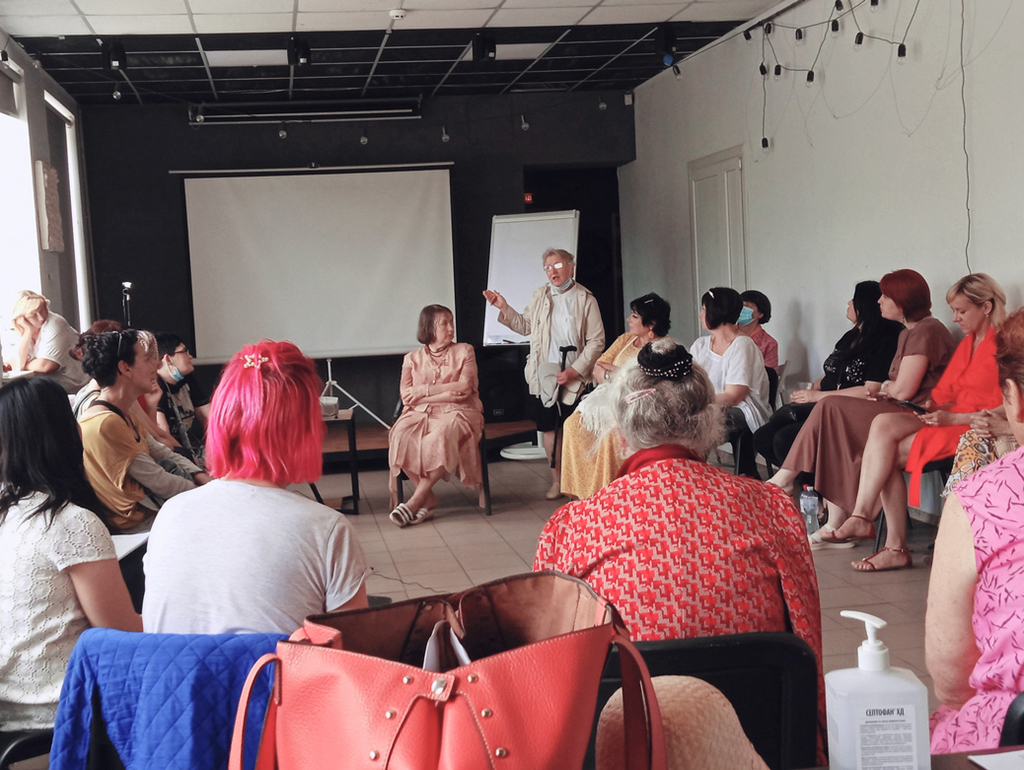About us
PeaceWomen Across the Globe is an internationally active feminist peace organisation based in Bern that supports women in contexts affected by armed conflict in their diverse efforts to build lasting peace.


Women living in communities close to the contact line are affected by the war between Ukraine and the autonomous Donetsk and Luhansk People’s Republics in multiple ways. At the Women’s Peace Tables they can both network and freely share their experiences and visions of peace. We interview Board member Margret Kiener Nellen and our project coordinator Annemarie Sancar after their project visit in September
Since May 2021, we have been conducting Women’s Peace Tables (WPTs) together with our Ukrainian partner organisation KRF Public Alternative and local groups in the war-affected region in the east of the country. There, women from different backgrounds and with different world views have been developing strategies together, looking at how they can make their everyday lives free of violence, improve their living conditions in the long term, and contribute to the longed-for end of the war.
Why was this conflict region chosen?
The war in eastern Ukraine has been going on since 2014. The area is the third most mined in the world after Afghanistan and Syria. Over 13,000 deaths and over 9,000 civilian wounded have been recorded so far. Violence and the militarisation of public spaces are increasing, far beyond the actual war zone. As a feminist peace organisation, we are compelled to contribute to the peace process here. The focus is on the indirect consequences and risks that the participants have identified: domestic violence, unemployment, inadequate social security, and disparate loyalties in the war. Thanks to relationships with local women’s networks, we have been able to establish contact to the local population, founded on trust. In addition, we can rely on long-standing relationships with international actors.
At the centre of our work is UN Security Council Resolution 1325 on “Women, Peace and Security”. It recognises the essential role of women as actors in peacebuilding. How was this agenda addressed at the WPTs?
The “Women, Peace and Security” agenda was the guiding principle for the initial questions at the WPTs: What does security mean? Where, as a woman, do I feel insecure? It became clear that women’s participation in peacebuilding is only possible if they have time and space, economic and social resources, and access to public services and networks. At the end of one of the WPTs, one participant said, “Peace is not just about ending war. Peace is within us as a community, as individuals living together.”
What are the initial findings from the WPTs?
The war, rampant poverty, gender-based violence as well as unemployment are at the centre of all narratives. Social insecurities, such as in the area of pensions and compensation for missing, wounded and killed people, as well as mistrust and scepticism towards the authorities contribute to actual and perceived marginalisation. Internally displaced persons, weapons and an often patriarchal police force are further building blocks in the architecture of fear. As one woman put it, “Violence has become the norm in our society.”
In Kyiv and Eastern Ukraine you participated in WPTs and met authorities, international organisations and the organisers of their own initiatives. What were these meetings about?
At the WPTs in Kharkiv, Sloviansk, Kramatorsk and Sievierodonetsk we listened. It was very important for us to listen to women from the communities, activists and victims of the war, as well as to representatives of the police, administrative bodies and women’s organisations. We received valuable background information from representatives of UN Women, the OSCE (Organization for Security and Co-operation in Europe), the International Committee of the Red Cross and the UN High Commissioner for Human Rights
Women were encouraged to organise their own initiatives. What is the purpose of this part of the project?
With these initiatives, designed by the women themselves, participants are motivated to work with local experts to carry out activities that quickly improve their situation in real terms. Initiatives include the communication of important legal principles, information activities, for example on violence against women, or art-based trauma healing.
This pilot project is to continue; what is the next step?
As a feminist peace organisation, we want to facilitate exchange and networking among women and women’s organisations so that a common understanding of peace can grow. We are now designing a longer-term programme with our local partners to improve everyday conditions so that peaceful coexistence becomes possible. Discussions relevant to war and peace will be held in the various networks, the findings will be condensed and projects derived from them. PeaceWomen Across the Globe’s network is an entry point for decisive political peace processes
Learn more about our Ukraine programme under Programmes.